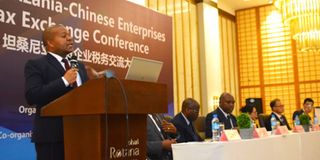Chinese businesses in Tanzania grapple with tax challenges, TRA vows swift resolution

The Tanzania Revenue Authority (TRA) Commissioner General Yusuph Mwenda, speaks in Dar es Salaam during the 2024 Tanzania-Chinese Enterprises Tax Exchange Conference held on August 23, 2024. PHOTO| COURTESY
What you need to know:
- The challenges include a heavy tax burden affecting their businesses; issues with unrecognised tax benefits previously agreed upon with the Tanzania Investment Centre (TIC); problems with VAT exemptions for contractors; and inefficiencies within the Tanzanian tax system that complicate operations
Dar es Salaam. Chinese businesses in Tanzania are grappling with significant tax hurdles, according to recent claims by Chinese enterprises operating in the country.
The challenges include a heavy tax burden affecting their businesses; issues with unrecognised tax benefits previously agreed upon with the Tanzania Investment Centre (TIC); problems with VAT exemptions for contractors; and inefficiencies within the Tanzanian tax system that complicate operations.
Speaking during the 2024 Tanzania-Chinese enterprises tax exchange conference, the Chairman of the Chinese Investment Association for Chinese Enterprises operating in Tanzania, Jensen Huwang, revealed that the tax burden is considerable, impacting not only Chinese enterprises but all companies operating in Tanzania.
“The tax burden is indeed very heavy. This affects not only Chinese enterprises but all companies doing business here,” Mr Wang said.
He further highlighted a critical issue where the Tanzania Revenue Authority (TRA) has not recognised tax benefits that were previously agreed upon with TIC due to the lack of a government notice.
“Unfortunately, TRA cannot recognise those tax benefits because the government notice has not been issued,” he explained.
Additionally, Mr Wang discussed the challenges faced by contractors, particularly regarding the VAT exemption for certain projects.
“Contractors are severely affected by the VAT issue, which takes a large portion of their profits,” he noted.
He pointed out that while project owners are responsible for providing documentation for tax exemptions, contractors often find themselves liable when these documents are not provided, creating an unfair burden on them.
He also raised concerns about inefficiencies within the Tanzanian tax system, which have complicated operations for many Chinese businesses.
“There are times when the tax system is not functional, leading to significant challenges for our members,” he said.
He called for improved communication between TRA and Chinese enterprises to address these issues effectively.
He went on to urge for a swift resolution to maintain investor confidence, stressing that this problem needs to be resolved as soon as possible.
“The business environment should be improved so that we can operate smoothly,” he said.
On top of that, the Chinese Ambassador to Tanzania, Chen Mingjian, underscored that Chinese enterprises are pivotal in China-Tanzania cooperation, contributing substantially to key sectors such as agriculture, manufacturing, mining, telecommunications, and services.
“Chinese enterprises have made significant contributions to promoting Tanzania's economic development and are the largest taxpayers among foreign-funded enterprises in Tanzania. Transparency in Tanzania requires these enterprises to strictly abide by local laws and regulations, pay taxes according to the law, and actively cooperate with the TRA,” she added.
Ambassador Mingjian also addressed the specific challenges faced by Chinese enterprises, including the recent amendments to the Tax Imports Control Act and the Income Tax Act in 2023.
“Recently, Chinese enterprises have encountered some problems and difficulties in tax payments. We have built a communication platform for TRA and Chinese enterprises to facilitate dialogue between the two sides,” she said.
She expressed optimism that ongoing dialogue and training would lead to a better understanding of the laws, regulations, and policies, resulting in progress in operations.
In response to those challenges, the TRA Commissioner General, Yusuph Mwenda, responded to the concerns by reaffirming the agency’s commitment to fostering a business-friendly environment while ensuring tax compliance.
“Our mission is to simplify business operations to enable companies to grow and contribute more in taxes, benefiting both the businesses and the country,” he stated.
He addressed the specific concerns of Chinese businesses, urging them to “obtain the necessary permits to operate legally in Tanzania” and adhere to procedures for tax-exempt projects to avoid complications.
He also stressed the importance of maintaining proper documentation for employee taxes, such as paying as you earn (PAYE), warning that non-compliance would result in legal action.
“Businesses must register if they are operating without the proper permits, or they will face legal consequences,” he said.
He continued that TRA remains committed to engaging with businesses to ensure smooth tax processes.
“Agency notices will be used only against chronic defaulters who obstruct our efforts,” the Commissioner assured.
He also encouraged businesses to report any mistreatment by TRA officials, promising that disciplinary actions would be taken against those found guilty,” he added.




